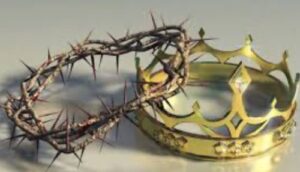 In this Podcast we read about more interactions between Jesus and the teachers of the Law and Pharisees. All this made me think about the juxtaposition of church tradition with what God says in His word. Tradition isn’t bad in and of itself until it gets put on the same authoritative level as the Words that God speaks.
In this Podcast we read about more interactions between Jesus and the teachers of the Law and Pharisees. All this made me think about the juxtaposition of church tradition with what God says in His word. Tradition isn’t bad in and of itself until it gets put on the same authoritative level as the Words that God speaks.
Here is the video link:
The audio versions can be found in Spotify and iTunes. The links are to the right.
Here is the transcript used for todays podcast:
Mark 2:13-27
Jesus Tells a Joke?
13 Once again Jesus went out beside the lake. A large crowd came to him, and he began to teach them. 14 As he walked along, he saw Levi son of Alphaeus* sitting at the tax collector’s booth. “Follow me,” Jesus told him, and Levi got up and followed him.
*Matthew 9:9 “As Jesus went on from there, he saw a man named Matthew sitting at the tax collector’s booth….”
There was much at stake for him in accepting Jesus’ challenge, for there would be little possibility of his returning to his occupation. Tax collecting jobs were greatly sought after as a sure way to get rich quickly.
Expositor’s Bible Commentary (Abridged Edition): New Testament Copyright 2004
I wonder why Matthew (Levi) chose to follow Jesus?
15 While Jesus was having dinner at Levi’s house, many tax collectors and sinners were eating with him and his disciples, for there were many who followed him. 16 When the teachers of the law who were Pharisees saw him eating with the sinners and tax collectors, they asked his disciples: “Why does he eat with tax collectors and sinners?”
17 On hearing this, Jesus said to them, “It is not the healthy who need a doctor, but the sick. I have not come to call the righteous, but sinners.”
Don’t tell me Jesus can’t tell a joke. This joke (as I choose to read it) is at the expense of the teachers of the law. Many of these self-righteous leaders (not all, there were some followers of Jesus in their ranks) would not hear the call from Jesus, but many of those labeled *“sinners” by these same leaders would hear and respond to the call of Messiah.
These Pharisees saw themselves as “healthy and righteous” and saw everyone else as sick and being sinners.
*”Sinners” denotes those people who refused to follow the Mosaic Law as interpreted by the Pharisees.“
Expositor’s Bible Commentary (Abridged Edition): New Testament Copyright 2004
I can’t help but read this as if Jesus was saying “I’m not here to talk to you. I’m talking to them i.e. the sinners. They listen… you don’t.”
In accordance with the definition presented above for “sinners”, it is easy to see that the Pharisees would consider Jesus as a “Sinner” as He did not follow the Mosaic Law as interpreted by the Pharisees. As an example, when He touched the leper to heal him, according to the Pharisees, that made Jesus unclean, and no Messiah would be unclean. Therefore, most Pharisees (not all… some saw the truth) would shut out of their minds any thought that would consider Jesus as Messiah, no matter how many people He healed or how many miracles He performed.
Jesus Questioned About Fasting
18 Now John’s disciples and the Pharisees were fasting. Some people came and asked Jesus, “How is it that John’s disciples and the disciples of the Pharisees are fasting, but yours are not?”
In the law the only required fast was on the Day of Atonement (Lev 16:29, 31; 23:27-32), but after the Exile four other annual fasts were observed by Jews (Zec 7:5; 8:19). In NT times the stricter Pharisees fasted twice a week (Monday and Thursday; cf. Lk 18:12).
Why they were doing this, Mark does not say, but their fasting was a sign (to them) of true piety. Therefore, some unidentified people asked why Jesus’ disciples did not give evidence of true religious piety by fasting.
Expositor’s Bible Commentary (Abridged Edition): New Testament Copyright 2004
The Pharisees, in their search for piety, added to the only required Fast (on the Day of Atonement). As stated, four other feasts were added, and then Pharisees fasted twice a week. It has been my observation that something non-essential that begins as a voluntary act becomes canon if practiced long enough. In truth, these extra fasts were not prescribed by God but were add-on practices… not wrong in and of themselves, but they were man-made inventions and they become wrong when they become expected or required.
19 Jesus answered, “How can the guests of the bridegroom fast while he is with them? They cannot, so long as they have him with them. 20 But the time will come when the bridegroom will be *taken from them, and on that day they will fast.
Fasting is associated with sorrow. In Jewish tradition, a Bridegroom and his friends celebrate the upcoming wedding – fasting during that period would be unheard of!
*(the word used implies a violent removal that causes sorrow).
21 “No one sews a patch of unshrunk cloth on an old garment. Otherwise, the new piece will pull away from the old, making the tear worse. 22 And no one pours new wine into old wineskins. Otherwise, the wine will burst the skins, and both the wine and the wineskins will be ruined. No, they pour new wine into new wineskins.”
Again we are faced with the struggle between old and new. Practices not originally required by God but engaged in as an act of piety (such as fasting) are fine …UNTIL they acquire the look and feel of the LAW itself. They are not the Law, but over time it is simply assumed that the man-made practice IS part of the Law. It’s not – yet it is assumed to be. Traditions are not necessarily bad in and of themselves, but when they become “canon” and put on equal footing with God’s Law, they go from being something to enhance the worshippers experience to something required for proper worship.
In the 400 silent years since the last time God spoke through a prophet or appeared Himself in a theophany or through an Angelic visitation, Jewish scholars and pious leaders studied the Law and came up with a long list of ways to implement the Law in their daily life. Some of these writings, originally the result of wise men studying the Scripture, came to be considered nearly the equal – if not equal – to the Mosaic Law itself. That was the old garment or the old wineskin.
The Sabbath
23 One Sabbath Jesus was going through the grainfields, and as his disciples walked along, they began to pick some heads of grain. 24 The Pharisees said to him, “Look, why are they doing what is unlawful on the Sabbath?”
25 He answered, “Have you never read what David did when he and his companions were hungry and in need? 26 In the days of Abiathar the high priest, he entered the house of God and ate the consecrated bread, which is lawful only for priests to eat. And he also gave some to his companions.”
27 Then he said to them, “The Sabbath was made for man, not man for the Sabbath. 28 So the Son of Man is Lord even of the Sabbath.”
The Sabbath was made for man. Jesus then follows that precept with the fact that if “The Sabbath was made for man…” then as a conclusion He can say (referring to Himself) that “the Son of Man is Lord even of the Sabbath.” He is inferring that He has the authority to say what is correct and what isn’t. This is a clear statement from the mouth of Jesus about His identity.
They were hungry – so they ate. There is freedom within the perimeters set by God’s Law. Eating on the Sabbath was certainly fine. The Lord of the Sabbath says so.
He wants us to step away from stifling man-made traditions and step into a new life that is free from man-made add-ons to God’s words.
Summary thoughts:
As a member of the worship community at my church, we have two distinctly different church services. One is the more traditional service with choir anthems and hymns, and the other with contemporary worship music. What I appreciate about this is we are not telling anybody how they must worship. We have not adopted man-made rules and put them on a par with God’s Word. But I have been in churches that force a particular style of worship (whether P&W or Hymns-based) and it is inferred that anything different is wrong. Sometimes it is about the version of the Bible that is used. Sometimes it is about the clothes we wear. You get the picture.
Jesus summarized the entirety of the Mosaic Law by saying the following in Matthew’s Gospel:
Matthew 22:36–40
36 “Teacher, which is the great commandment in the Law?” 37 And he said to him, g“You shall love the Lord your God with all your heart and with all your soul and with all your mind. 38 This is the great and first commandment. 39 And the second is like it: iYou shall love your neighbor as yourself. 40 jOn these two commandments depend kall the Law and the Prophets.”
We must be careful about trying to pour new wine into old wineskins. If we equate “new wine” with God’s desires, and the “old wineskins” with our man-made traditions, the parable becomes clear. The new wine will ferment and cause the old wineskin to burst, and the new wine is lost in the process. We can lose the truth of what God wants us to possess if our focus is on the traditions that have built up over the years. Man-made traditions and God’s Ways do not mix.
In His Grip,
Paige

Mark 2:13-27… of Wineskins and tradition
VIEW THE COMMENTS